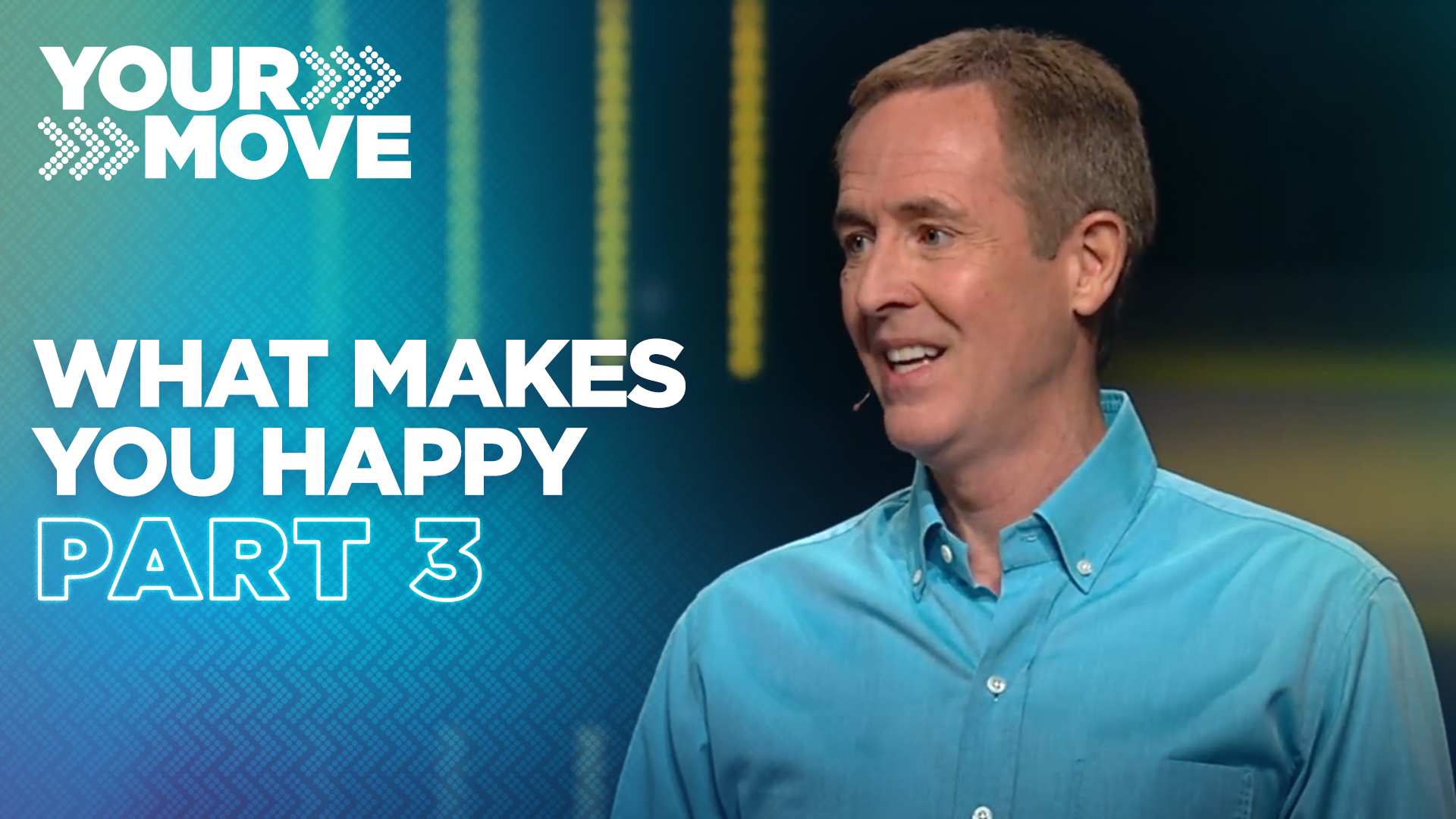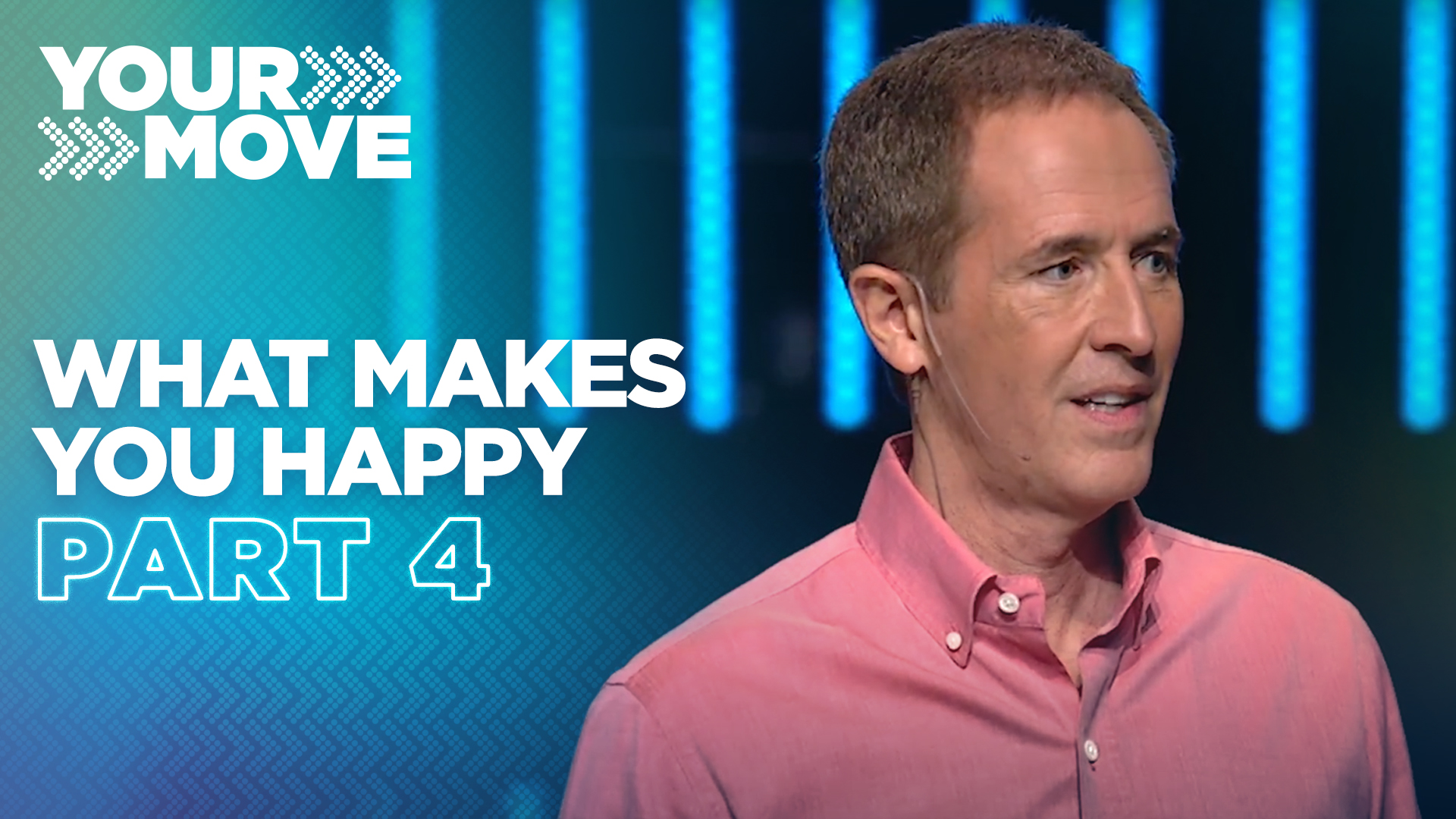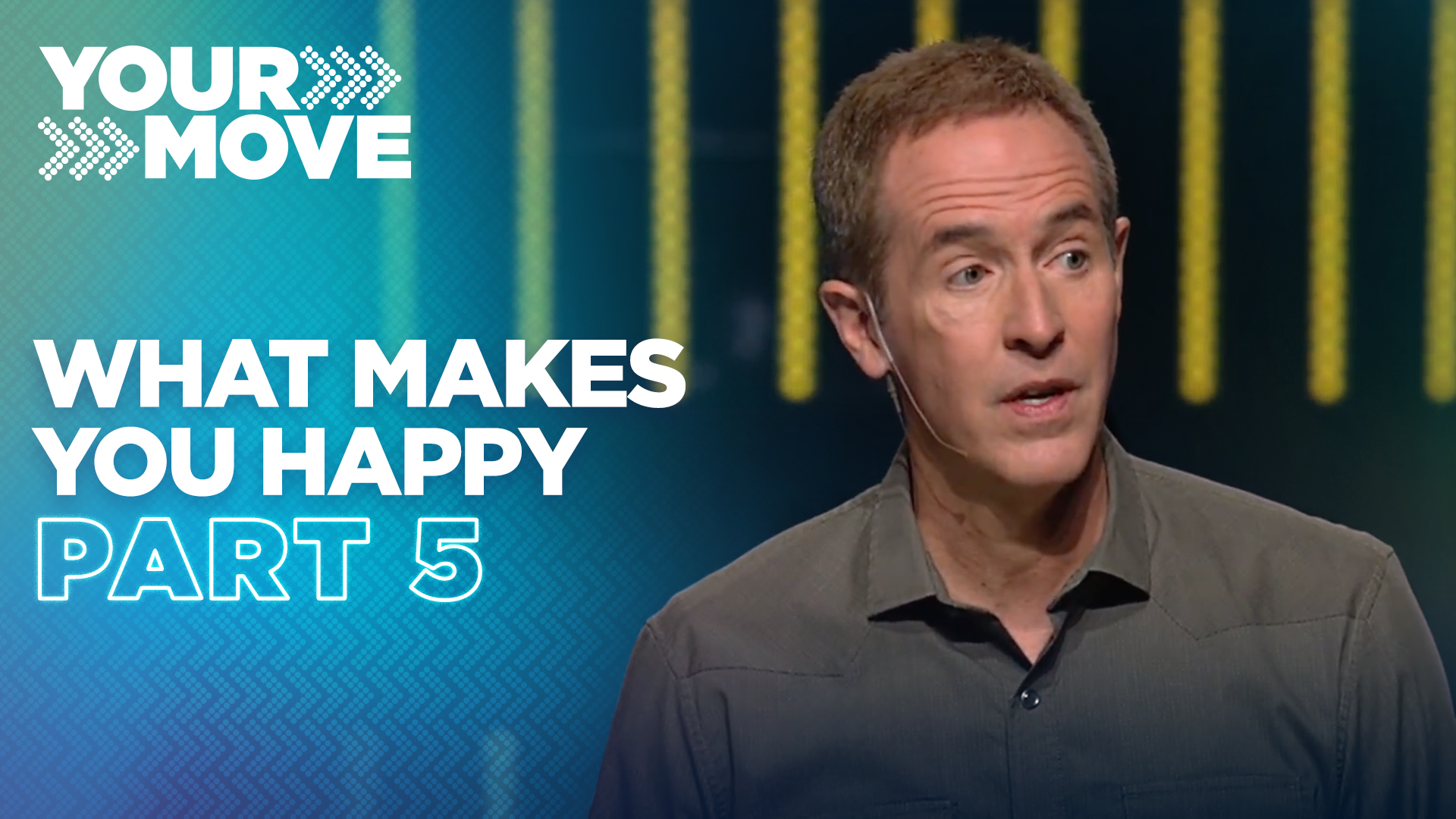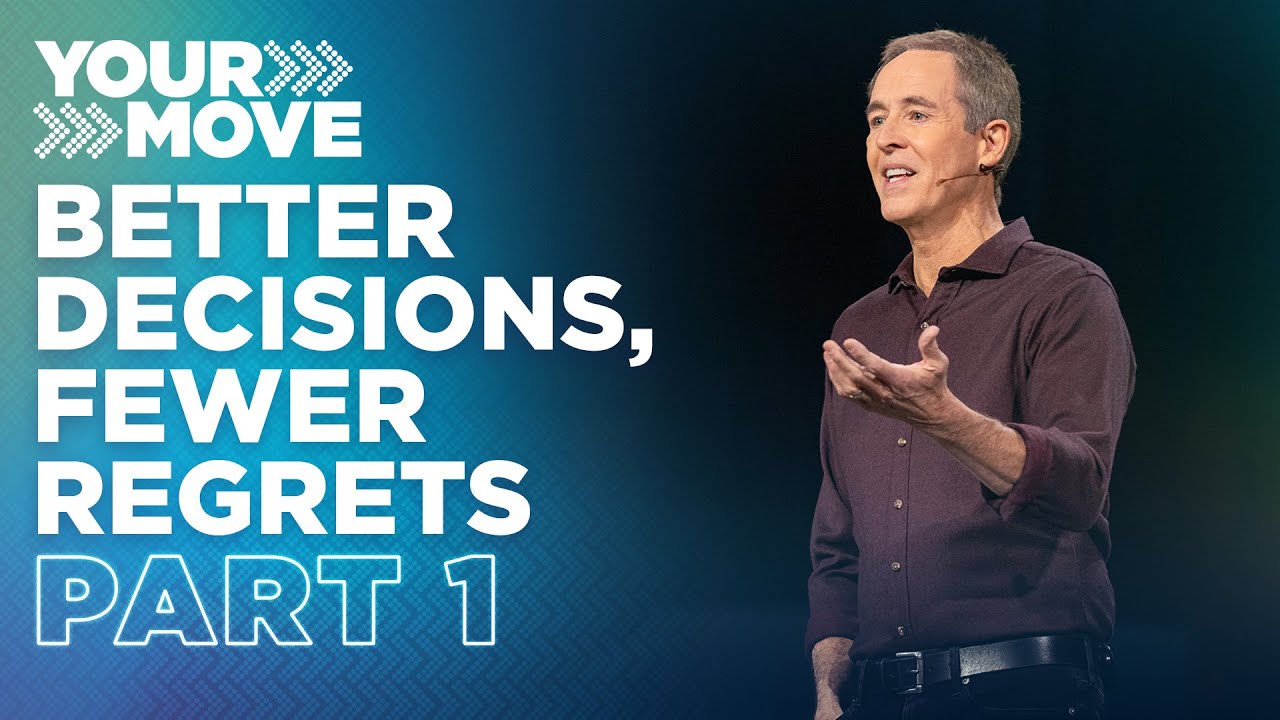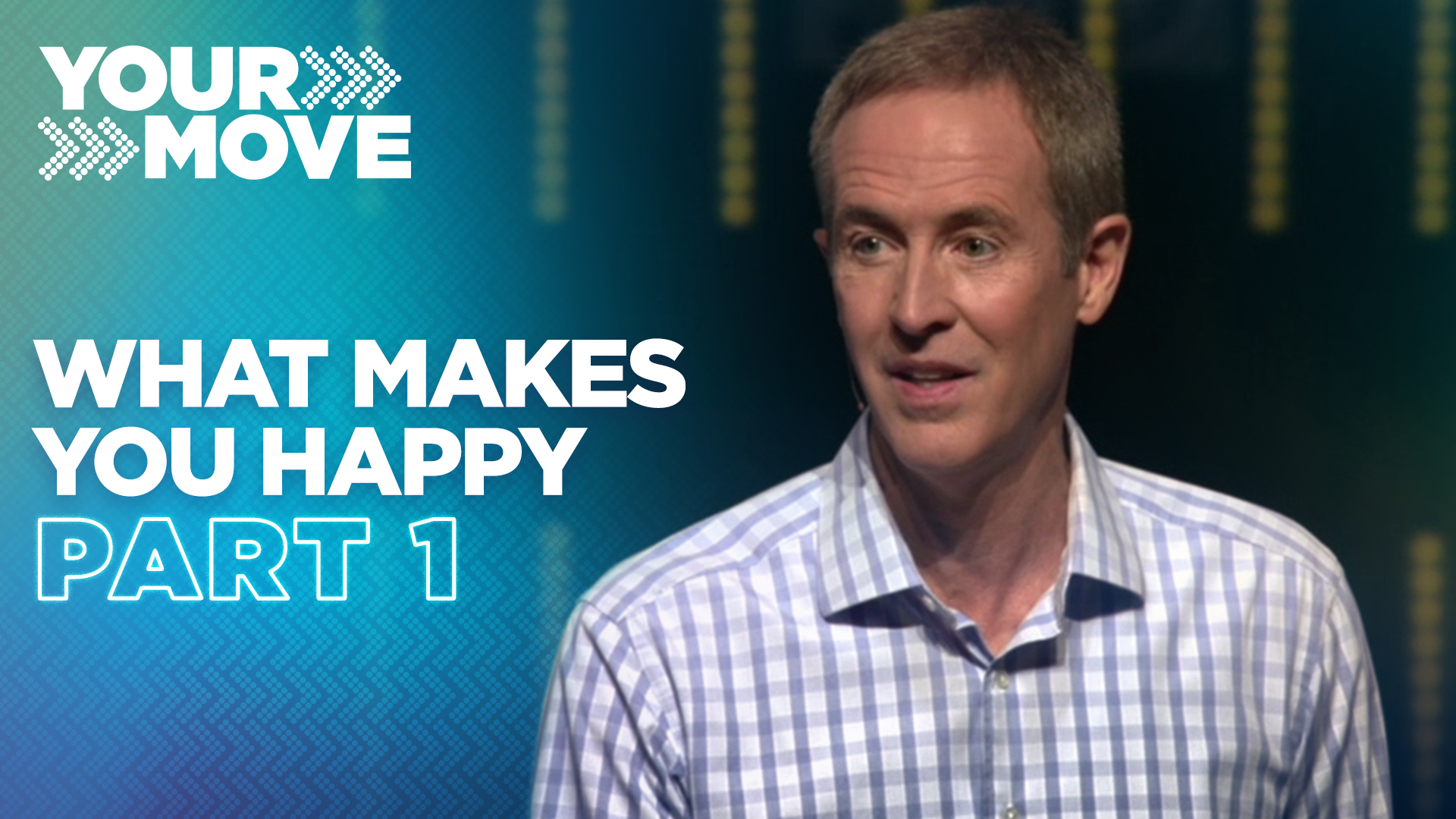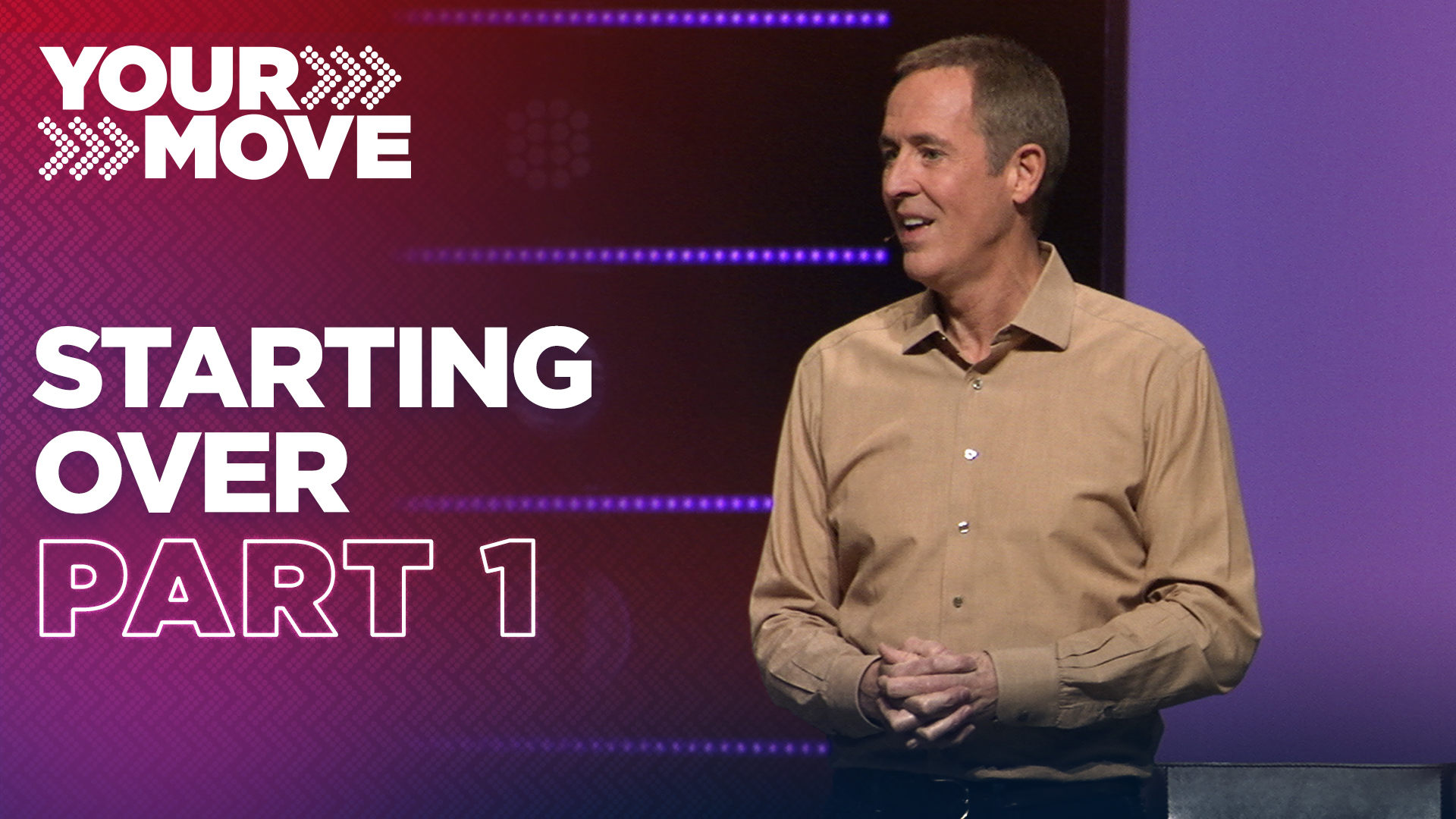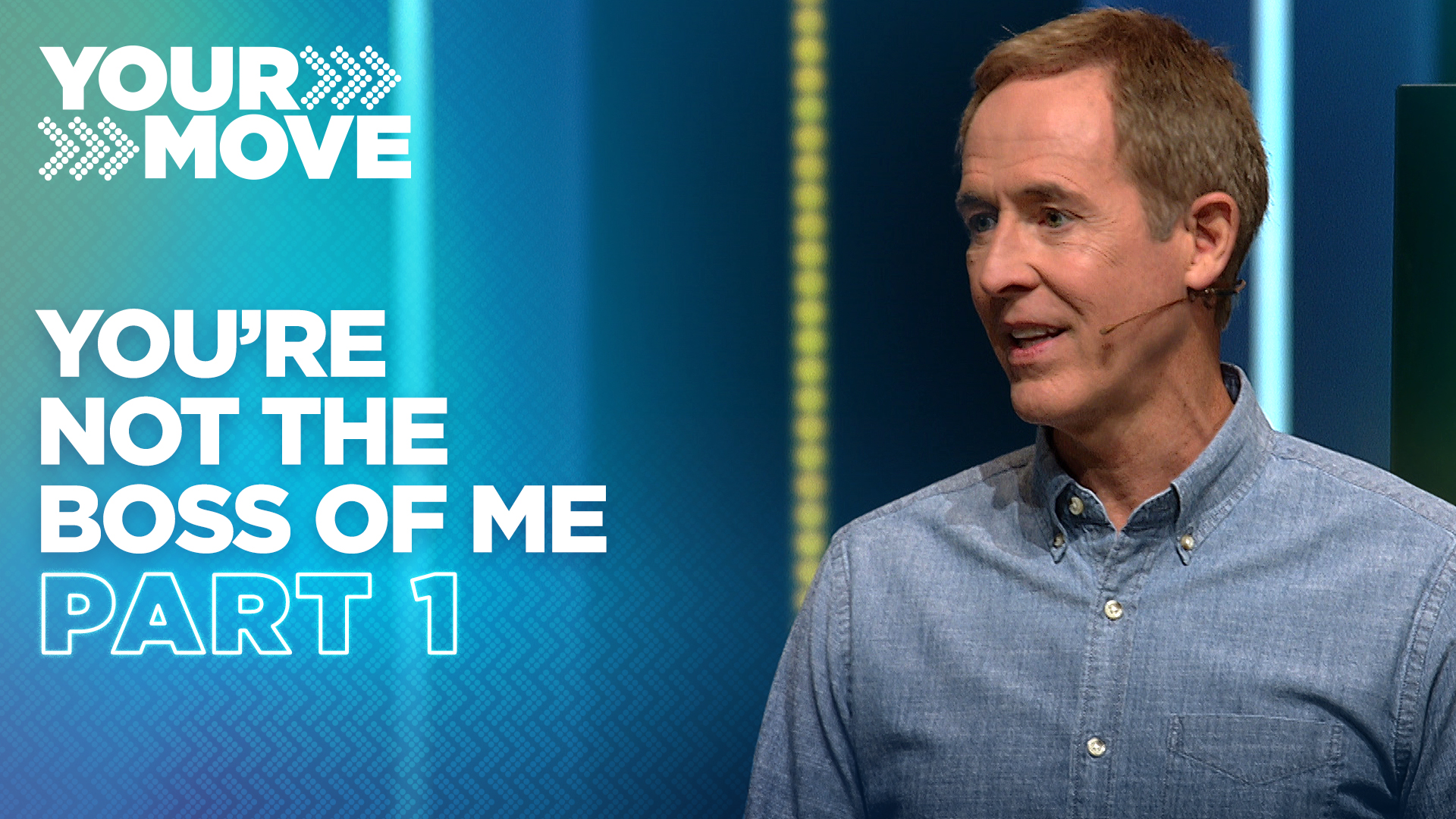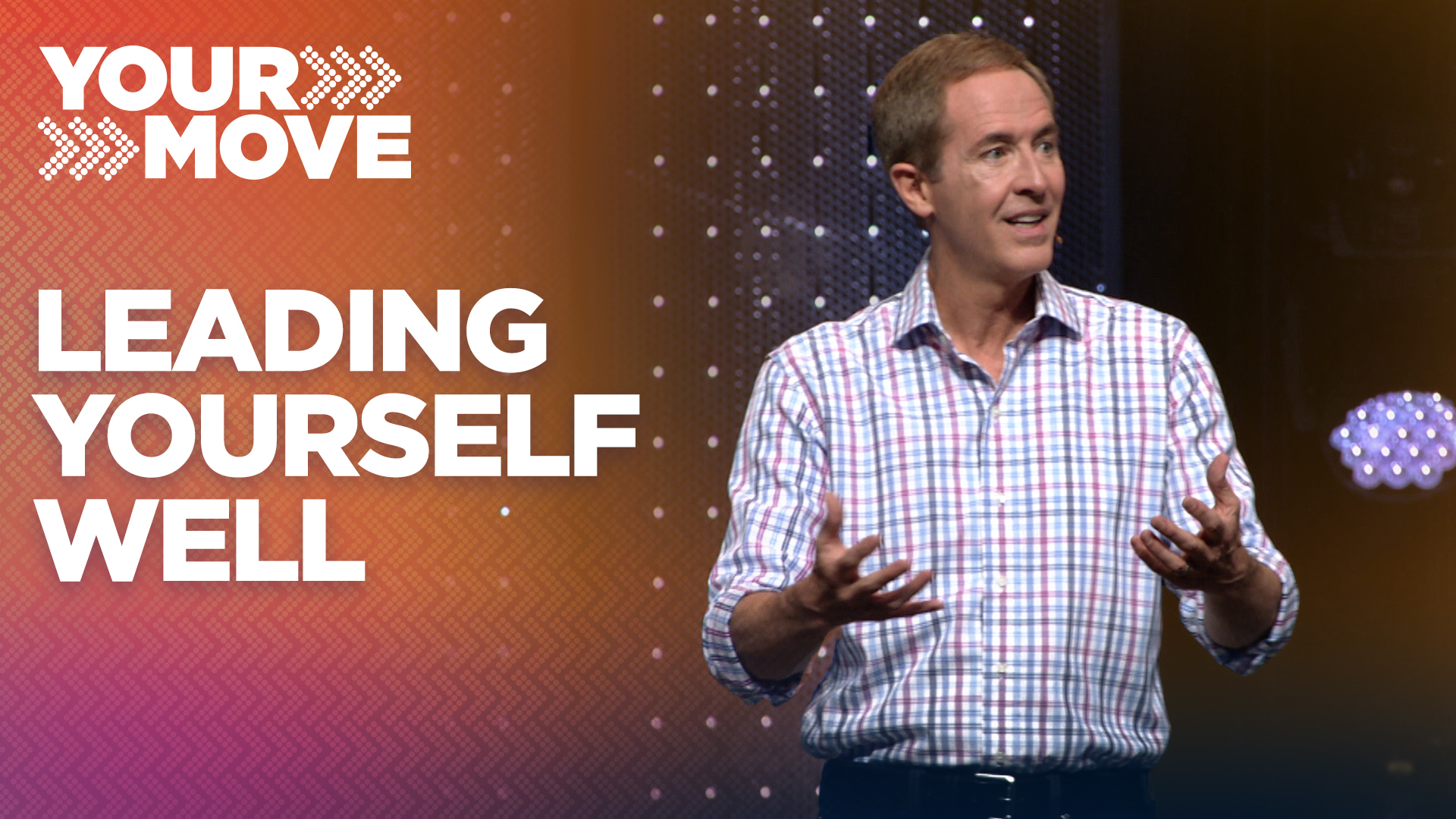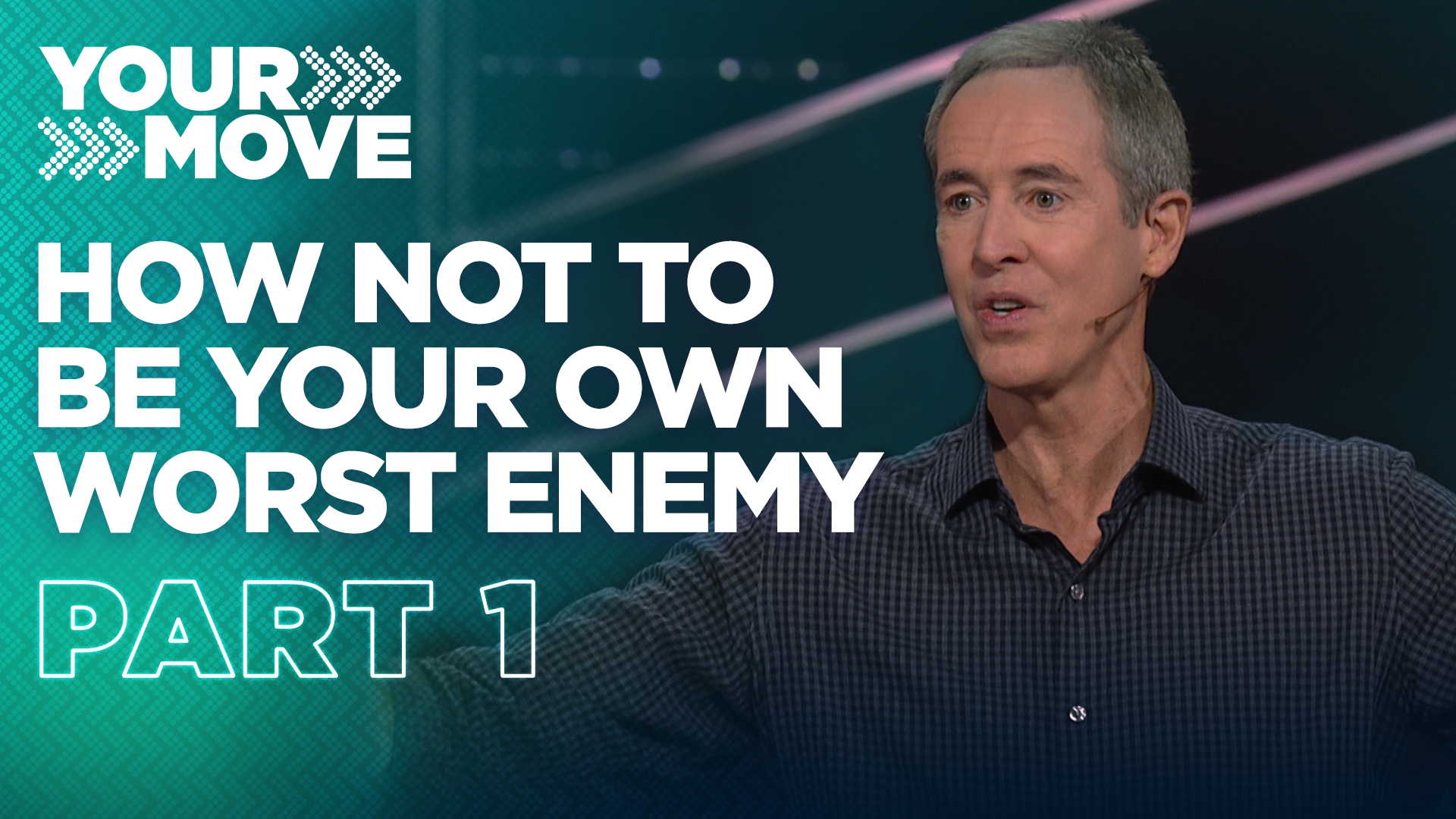Sometimes it seems that happiness and Christianity are mutually exclusive. In this episode, Andy argues that the opposite is true.
1. Do you have trouble believing that happiness follows from being meek, merciful, and/or pure-hearted? Why or why not?
2. What are some reasons it’s difficult for us to live as though we’re dependent on God for provision, pardon, and protection? What do we lose when we live like that?
What do we gain?
3. Read Matthew 7:24–26. To what extent have you built your life on dependence upon God? How do you think that has affected your happiness?
NOTE: The following content is a raw transcript and has not been edited for grammar, punctuation, or word usage.
We’re in part two of a series called, What Makes You Happy. So here’s the question, What Makes You Happy. No thing.
No thing. No thing makes you happy, there’s not a thing that can make you happy because happiness is more about a who, than a what. Happiness always involves a who or two, says Dr. Seuss. Happiness always involves a who, or two.
Now if you grew up in church, or around church, perhaps speaking of God, you heard something that went kind of like this. God doesn’t want you to be happy, he wants you to be holy. How many have ever heard something similar to this, have you ever heard this before? That God doesn’t want you to be happy, God wants you to be holy, like there’s this dichotomy between happy and holy, like maybe God’s, or Jesus’ favorite song was if you’re happy and you know it repent, like don’t be happy, right?
So there is this thought, maybe you’ve bought into this, maybe this is why you don’t go to church, you’ve given up on religion, because you just got the feeling, I’m either going to be like a good Christian, or a good whatever you were raised, or I’m going to be happy, and it seemed like all the happy people weren’t the church people, and so you found yourself in this contrast, and what we’re discovering is that that is a false dichotomy. That you can actually be, not only can you be happy and be a Jesus follower, Jesus says that he knows more about happiness than anyone else, and those of us who believe in God, believe that must be the case because God created us, and you know this about yourself, God created you with the capacity for joy, and God created you with the capacity for happiness, and why would God create such extraordinary capacity, and not want you to fulfill it through him?
So today, as we move along with the series, we’re going to look at the words of Jesus in his most famous sermon, we know it as the sermon on the mount. The sermon on the mountain includes what is often times referred to as the B attitudes, they all start B because if you grew up in church it’s blessed, blessed, blessed, but we say the word blessed, blessed our, blessed our, and in this message, essentially Jesus answers the question what makes you happy? In other words you say Jesus, what do you think makes us happy? Jesus would say here’s what makes you happy.
Now the interesting thing is the word blessed, or if you grew up in church, blessed, you know, blessed, blessed, is a Greek word, machorios, and it actually means fortunate, or happy. So this is a message that Jesus gives where he says this is what happy people do, this is how happy people behave. If you want to be happy, here’s what you should do, here’s how you should think. He gives us a description of happy people.
In fact even if you’re not a Jesus follower, even if you’re not a Christian, these words are so extremely rich, it’s hard to argue with Jesus’ logic, and then at the end we’re going to step back and say what do all these things have in common? The thing that all eight of these things have in common leads us to a brilliant insight about happiness that you will either embrace, or you will spend the rest of your life butting up against, so you might as well embrace it.
So here’s Jesus’ sermon on the mount, the Beatitudes, here’s how it begins, here’s the context. Now when Jesus saw the crowds, he went up on a mountainside, and he sat down with his disciples, and again in the New Testament, there’s three groups of people that follow Jesus. There’s the apostles, like the 12 apostles, then there’s disciples, those are the people that believe in Jesus, follow Jesus, everywhere he went, and then there’s the crowds, hundreds of people, sometimes thousands of people who follow Jesus. So Jesus got all three, he’s got his apostles, the disciples are coming around, and the crowds are following him. So he went up on a mountainside, and he sat down, his disciples came to him, and he began to teach them. Now this is the most famous sermon he preached, we know that he repeated this content more than once, and what did he choose to preach this most famous sermon about, but happiness, happiness, here’s what he said.
He said blessed are, or blessed are, the poor in spirit, for theirs is the kingdom of heaven, and right out of the chute, right off the top Jesus addresses one of the biggest myths as it relates to happiness, and it’s essentially this, that rich people are happy people, or that perhaps that poor people are happy people, and Jesus said rich people aren’t happy, and poor people aren’t happy, let me tell you who’s happy.
The happy people are the people who are in poor in spirit, and here’s what he meant, to be poor in spirit is to acknowledge that no matter how much you have, or how little you have, you are completely dependent upon God every single minute of every single day. Poor in spirit, to kind of tease out the definition, are people who embrace their daily dependence on God regardless of what they have. The poor in spirit are those that have a little, or have a lot, or have something in between who wake up every day and say God, I am no less dependent on you today, than I was when I had absolutely nothing. Those who are poor in spirit live every single day as if they are dependent on their heavenly father, because here’s the thing, and some of you have learned this the hard way, perhaps some of you are on the verge of learning this the hard way.
The moment, this is what Jesus knew, the moment you put your trust in riches instead of him who richly provides, you are unhappy. The moment you transfer your trust from your heavenly father to your riches, and by riches I mean your opportunities, your education, what you have, what you own, what you’ve borrowed for, where you live, what you drive, all the stuff that we kind of build our self esteem around. The moment we transfer our trust from him who richly provides to the riches themselves, we become unhappy, and here’s why, because suddenly it is up to you to control outcomes, and you can’t control outcomes. You can influence outcomes, but at the end of the day, none of us control outcomes, and the moment that I place my trust in riches instead of him who richly provides, suddenly I take upon myself a responsibility, you take upon yourself a responsibility that is too big for you to carry.
This is why you’ve met unhappy poor people, middle class people, and rich people. Anyone who is feeling the burden of it is up to me is by definition unhappy, and Jesus says let me tell you who the happy people are. They’re rich, they’re in the middle, and they’re poor. They’re people who are poor in spirit, who recognize I am as dependent on God for my provision as I have ever been, because here’s the thing, the poor do not attempt to find ultimate satisfaction in things because things are not an option. That at the end of the day my confidence is not in stuff, my confidence is in the one who provides the stuff.
Jesus says you want to be happy? The happy people are the people who are poor in spirit, they recognize that at the end of the day they are completely dependent upon their father in heaven, that’s just the first one, I mean this is so rich, he goes on, he says this.
Blessed are those who mourn, for they will be comforted. What? Yes, blessed are those who mourn, do you know who mourns? Mourners are people who are emotionally connected, people who recognize, and don’t hide from, or don’t run from the fact that there are bad things in the world, there’s unjust things in the world, there’s randomness in the world, and they’re willing to walk into those moments of death, and sorrow, and grief, and stay there and face it full on, and embrace the fact that death is actually a part of life. In our culture, this becomes, this is more, and more, and more unusual, and here’s why, because death is so sanitized for most of us.
All of us have had that experience of someone we know dying, and we know we need to go to the funeral, and it’s like what time does this start? I’m so sorry they died, but I want to get in, I want to sit in the back, I want somebody to see that I was there, and then I want to leave, and I want to get back to work, and I want to just kind of shake it off, maybe get a drink on the way back to the office, I don’t want to think about death, I want to move on with my life, and Jesus said if that is your attitude towards death, you will never be happy.
Let me just kind of put this in my words, as a pastor, I’ve seen this so many, many times, this is a little warning for some of you, this is sort of what Jesus was getting at. Fear of dying will rob you of the joy of living. Fear of dying will rob you of the joy of living. Fear of death will rob you of the joy of life, and here’s what I mean by that. For the person that is not willing to fully embrace the reality that all of our lives are bookended, that they spend so much time and energy trying to avoid, and trying not to think about the inevitable. Ultimately it robs you of your happiness, and Jesus says let me just give you a clue, happy are those who when they are faced with the fact that this life comes to an end, who are willing to face it, feel it, endure it, and be a part of it. He says you will find contentment and happiness there far more than if you spend your life trying to pretend like it’s never going to happen to you, wow.
Jesus goes on, he says this, he said blessed are the meek, for they will inherit the earth. Now our response to this word is almost all negative, because nobody has on your list of when I grow up I want to be meek, right? Dads, when you think about the man that’s going to marry your daughter some day, you’ve never said to your daughter honey, I really hope you marry a meek man, I really do. I’m thinking meek, you’re thinking no, I want him to have a job, I don’t know about meek, and here’s why. Because we think as meekness as weakness, but Jesus understood meekness is a powerful, powerful, powerful thing.
Here’s what meekness is, kind of a wordy definition, meekness is a proper estimation or valuation of one’s self. A proper estimation, or valuation of one’s self within the broader context of God’s creation and love. In other words a meek person is a person who faces the reality about who they are, that they are part of God’s creation, that God is up to something in the world, but they are not the center of it.
Meekness is not weakness, meekness is simply acknowledging God’s estimation, and evaluation of me based on who he created me to be, and within the context of God’s broader creation. He says you want to be happy? Embrace meekness.
He goes on, he says and blessed, blessed are those who hunger, and thirst for righteousness, for they will be filled. In other words blessed are those who are committed to doing the right thing. We touched on this a little bit last weekend, and again it’s somewhat intuitive, but Jesus reminds us, essentially he’s saying this, happy, if we use the word happy, happy are those with no guilt, no regret, and a clear conscience. Happy are those with no guilt, no regret, and a clear conscience.
Jesus says at the end of the day, those who hunger and thirst for righteousness, those who are leaning in and asking the tough question, what is the right thing to do? What is the right thing to do? What is the right thing to do? He said at the end of the day you will be happy, but isn’t it true? When you think about the people in your life, or you think about that season in your life, or perhaps you look at the season that you’re in right now, that doing the wrong thing did not create happiness?
I mean isn’t it true that your greatest regret wasn’t when you did the right thing, it’s when you did the wrong thing? Isn’t it true that your greatest regret was about that time when you knew the difference between right and wrong, and you decided to do the wrong thing and you want to go back and redo it? I doubt there’s anybody here listening, or watching who says if I could only go back and redo high school, I would get in more trouble, if only I could go back to my freshman year in college, I would, you know, get in more trouble.
Isn’t it true that our greatest regrets stem from the fact that we knew the difference between right and wrong, and we chose what was wrong? Isn’t it true, the thing that we dragged around that we wish we could erase from our mind, and erase from our lives were those decisions that were the wrong decisions? Jesus says look, I know this may not be popular, I know it may sound religious, but happy are those who hunger, I love this, hunger, and thirst for righteousness, for ultimately they will be filled, then he goes on, he’s not done.
He says this, he says blessed are the merciful, for they will be shown mercy. What’s mercy? He’s essentially saying this, I love this, happy are the relationally generous, happy are the relationally generous. Happy are those that give people exactly what they don’t’ deserve relationally. Happy are those who aren’t seeking revenge, happy are those who forgive, happy are those who don’t hold grudges, happy are those who put away bitterness, happy are those who are not waiting to be paid back from someone in their past, because you know this. You’ve never met a happy bitter person. You’ve never met a happy person who holds a grudge. You’ve never met a happy person who is waiting to be paid back from some relationship, but what you have met are people who have been extraordinarily mistreated. You’ve met people who have gone through circumstances you wouldn’t wish on your enemy, and somehow they’ve emerged on the other side, and they’re fine, they’re happy, and when you scratch beneath the surface, what you discover is this.
These are men and women who understand what it means to be relationally generous. They decided to extend to their father exactly what their father didn’t deserve. They decided to extend to that boss, exactly what that boss didn’t deserve. They decided to extend to that ex husband or that ex wife, exactly what that ex husband or wife didn’t deserve. They were relationally generous, and even though they were never paid back, even though they never extracted revenge, even though they never got an apology, even though the person that offended them never owned up to what they did, they are happy, and Jesus says I understand this. Happy, blessed are the merciful, for they will receive mercy, isn’t that brilliant? I mean isn’t it somewhat intuitive? But isn’t it something that we quickly forget?
Then he goes on, and he gets to my favorite one, and I think this is my favorite one because I think it’s the one that doesn’t get enough attention, it’s sensitive, because in this next statement Jesus essentially baits us in, he says would you like to see God? Or would you like to see so clearly in life that you would recognize where God is at work in the world? Would you like to be able to recognize God’s plan for your life? Would you like to recognize what God wants you to do in tough decisions, whether it has to do with relationships, or money, or your future, or your career? Would you like to see clearly? Would you like to be able to see as clear as anyone can possibly see? Would you like to be able to look at circumstances, and invitations, and opportunities, and see what leads to trouble, and what leads you to a place where you will be able to avoid regret? Would you like to have that kind of clarity in life? To which all of us would say yes.
Jesus leans into his crowd, and he leans into us, and he makes this incredible, incredible statement. He says blessed are the pure in heart, for they will see God. I just think that’s one of the most profound things in the entire New Testament, perhaps the entire scriptures, and I’ll tell you why, part of it is because of my experience as a pastor, because I have talked to countless people who have said, and perhaps all of us, to some extent, would say this ourselves. People who would look back on their past, or previous relationship, or previous season in life, and they would say Andy, I just don’t know how I allowed myself to get into that, why didn’t I see it coming? How could I have been so stupid? How could I have been so naïve? Why didn’t I see it coming? Why didn’t I, to use our word, why didn’t I have the clarity I needed to stay out, to say no, to get up and leave, to walk away, to just stay away? What was going on? As gently as I know how, I say Jesus addressed this.
Jesus has invited us to purity in a culture that doesn’t even use the word except when it talks about water, but other than water, the idea of purity, and the idea of moral purity is so not in vogue, is not something anyone talks about, but Jesus says I just want you to know the clarity that you need for life is found in purity, moral purity, ethical purity, the decision to purify your mind, to look above and beyond, to decide you know what? I don’t have to experience everything in life to understand life, in fact Jesus will say it’s the opposite. If you would like to have clarity about life, if you want to have clarity about sin, stay away because purity leads to clarity. He says blessed are the pure in heart, for they have the greatest chance of identifying and seeing the activity of God.
For some of you right now, this is a real issue, because you’re trying to make a decision relationally, morally, ethically, and there’s something in you that says I’m missing out, I’m missing out, I’m missing out, I’m missing out. Jesus would say to you no, and if you will purify your mind, and if you will renew your mind, and if you will think my thoughts, the day will come when you will realize you weren’t missing out, you’ll have the clarity to see that following me leads to happiness.
Blessed are the pure in heart, for they will see God, that is a big idea, and he keeps going.
He says this, blessed are the peacemakers, for they will be called children of God, why? Because your heavenly father wants to make peace with you, and when you make peace with other people, you’re acting like your father in heaven. So he says blessed are the peacemakers, for they will be called children of God.
Now let me just turn it around and let me ask you this question, do you know any happy troublemakers? I mean when you think about the person who is always stirring it up in the office, always stirring it up in school, always stirring it up in the fraternity or sorority, they’re just always making trouble, do you consider these happy people, do you know any happy trouble makers, the opposite of a peacemaker? Of course not because troublemakers are troubled by other people’s happiness. Troublemakers are troubled by happy people. They really are. Troublemakers like to target happy people because troublemakers want everybody to be unhappy, it’s just the nature of troublemakers.
And Jesus says look, there’s no happiness found in troublemaking, there’s happiness found in peacemaking, and here’s my way of saying it. Happy are the reconcilers, happy are the people that are willing to walk into relationships that are broken, or breaking, and those who make peace, happy are the peacemakers, happy are the reconcilers.
Now isn’t that just true? I mean when you know, when you think of happy people, aren’t they reconcilers rather than troublemakers? How did Jesus know this? How did 2,000 years ago, why was he able to do such an extraordinary job dissecting happiness and inviting us into it? This is why whether you’re a Christian or not, whether you take Jesus seriously or not, whether you believe he’s the son of God or not, you should read the words of Jesus, because Jesus was constantly inviting people who did not believe he was the son of God to follow him anyway.
Then he gets to the one that’s like, okay, mercy, I got the blessed are the merciful, I can kind of go with, and the pure in heart, not sure I’m going to do that, but it kind of makes sense because I look back in my life and I should have seen it coming, and now I can see it, and I wonder why, I get that, but this next one is where we put both feet on the break, it’s like I just can’t go there with Jesus, but I’m telling you, this may be the most brilliant one of all. Here’s what Jesus said to wrap it up.
He said blessed are those who are persecuted because of righteousness, for theirs is the kingdom of heaven. To which we say okay, see this word, and happiness, they do not go together. This word, and blessed don’t go together. If I’m being persecuted, if I lost my job for doing the right thing, or I failed a test because everybody else had the notes, but I didn’t get the notes, and I didn’t want to cheat, and I failed the test, and then my GPA goes down. I mean there’s no I’m blessed based on being persecuted, but here’s what Jesus was getting at, and here’s what becomes clearer throughout the entire New Testament, and here’s what we will all discover in life, so let me go ahead and say it for you in case you haven’t gotten there yet, and it’s simply this. You are going to suffer in this life for doing right, or for doing wrong.
In this life, in your life, you are going to suffer for either doing the right thing, or you’re going to suffer for doing the wrong thing, but you can be happy, you can only be happy on one side of that equation, you can’t be happy on the other. You can be happy for, you can be happy when you’re persecuted for doing the right thing, because at the end of the day you have peace with you, and you have peace with God, but if you suffer for doing the wrong thing, you don’t have peace with you, and you don’t have peace with God.
Jesus draws us into this broader context of saying to just think about it. In your life you are going to be persecuted, you are going to be mistreated. Do you want to be mistreated for doing the right thing, or do you want to be mistreated for doing the wrong thing? Blessed are those, happy are those, when it comes down to it, choose to pursue righteousness even when it costs them. Because you can be happy doing the right thing, and facing the consequences, you cannot be happy doing the wrong thing and ultimately facing the consequences for a decision you should have never made. Jesus says this is how you live a blessed life, this is what it means to be happy, these are the activities, these are the mindset, this is how you achieve happiness, but here’s the question, as I said at the beginning.
The question for us today, because there’s so much detail, there’s so much more we could say, what’s the common denominator? In other words when Jesus finishes this part of the message because he moves onto some other stuff, what is the takeaway from all that detail, all those applications, and all those words? The take away, the big aha moment, the thing that perhaps could be life changing for some of you as you struggle with this season of your life, is that through all of these words, Jesus brings us to this unavoidable conclusion, that happiness, happiness is an outcome. Happiness is a result. Happiness is about something now that leads to something later. Happiness is more about ultimate than immediate, that happiness is not immediately accessible.
In other words you sow and you reap your way to happy, just as some of you, if you were honest would say, and I have sown and reaped my way into unhappiness. The place that you are, the place that you wish you could avoid, the place that you wish you’d never arrived, you sowed your way there, and Jesus says I have some great news, you can sow your way out, and you can sow your way to a blessed life.
You can decide now to embrace meekness. You can decide now to be relationally generous and to become a merciful person. You can decide now that from now on I’m not going to be a divider, I’m going to be a peacemaker, not a troublemaker. You can decide by God’s grace from now on, even if it costs me, I want to be a person who hungers, and thirsts for righteousness, I want to commit to doing the right thing.
I’m going to become a reconciler, not a divider, and by God’s grace, even if it means I’ve got to get new roommates, even if it means I need to move, even if it means I need to cancel some subscriptions, I am going to pursue purity because I want to see God.
Happiness is an outcome, it’s a result, you sow, and you reap your way there. This is why at the end of this incredible sermon, his most famous sermon, at the end of this sermon Jesus gives us a little parable. here’s how he concludes this powerful, powerful teaching, he says this.
He says therefore everyone who hears these words of mine, and they all heard, and puts them into practice, not goes, that was really good, I wrote that down, not says my mom really needs to hear this, not who says that was convicting, or says I’ve never heard anything like that before. He says anybody who hears what I just said, and doesn’t, just agrees with it, but puts it into practice, is like a wise man who built his house on the rock, and this took some time, a brand new house built by a builder is not immediately accessible, it takes awhile, and Jesus says the person who hears what I just said, and decides from this day forward, from this point on, he says is like a person that began the process of building a house on solid rock, nothing changed immediately, but something changed eventually.
But then he says this, remember the flip side? But everyone who hears these words of mine, and does not put them into practice, even if you agreed, even if you thought it was interesting, even if you knew somebody else who needed to hear this. He said anyone who hears these words of mine, and just walks away, and doesn’t put them into practice, you get no credit for hearing. You get no credit for listening., and Jesus says anyone who hears these words of mine and does not put them into practice is like a foolish man who built his house on sand, which took some time, there was no immediate consequence or outcome, but you know the rest of the parable, and eventually there was a storm, and at the end of the storm, the man who’s house was built on the rock, his house was standing, the man who built his house on the sand had nothing but regret, nothing to show for it.
Happiness, please don’t ever forget this. Happiness is an outcome, happiness is a result, you sow, and reap your way into happiness, and if we were to say Jesus, what makes a person happy? He would say everything I just told you, follow me. Sow your way there. Isn’t that amazing?
So to step back and review, and get setup for next week, I’m going to ask the question again, but now we have two answers, so here’s the question. What makes you happy? We all know the first answer.
No thing.
No thing, that’s right. What makes you happy? Sowing, that’s right, so let’s say it again, both answers, what makes you happy? No thing, it’s more about a who than a what. What makes you happy according to Jesus? Sowing, that’s what makes you happy.


